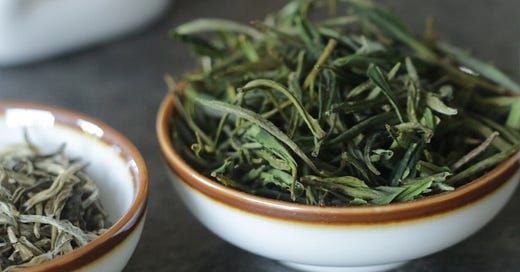Is Tea an Herb?
Tea isn’t technically an herb, but its benefits act like one. Explore the overlap of tea, herbal medicine, holistic health, and natural wellness.
What if you could feel better without medications? What if there were a delicious drink that could calm your nerves, soothe your soul, reconnect you to nature, and be good for both your body and mind? What if a drink could deliver the awakening qualities of coffee without the jitters and the anxiety? Would you drink it?
You probably already do. That drink is tea, one of the most popular drinks in the world, and for good reason.
When we examine medicinal plants, we measure their potential benefits to human health. Long before our beloved tea was a beverage, it was a medicine. The tea plant has thrived for thousands of years under the nurturing care of the Earth, its leaves steeped in the wisdom of the land.
Tea originated in the ancient forests of China, where leaves from the Camellia sinensis plant were first brewed thousands of years ago. Okakura Kakuzo, the Japanese philosopher, famously called tea the "cup of humanity."
Tea is surrounded by romance and was not just a beverage but a sacred art form. It was the elixir of scholars and poets, a muse for artists, and a symbol of hospitality in many cultures. Its essence was intertwined with the spirit of nature itself, and every sip carried with it the whispers of the mountains, the fragrance of the flowers, and the wisdom of the ages.
What you drink every day matters more than you think
Beverages comprise 20% of our daily intake—yet most people reach for drinks that deplete rather than nourish. If you're not drinking tea, you're missing out on one of the simplest, most effective ways to support your health.
Tea isn't just a comforting ritual—it's a daily wellness ally. From boosting immunity to reducing stress, tea has earned its place as the most consumed beverage in the world (second only to water).
In the wellness world, tea and herbs often go hand in hand. But when talking about what qualifies as an "herb," things get a little more nuanced. One of the most common questions I hear is: Is tea an herb?
Technically, no. But it's not that simple.
True Tea vs. Herbal Tea
True teas—like green, black, oolong, white, and pu-erh—come from a single plant: Camellia sinensis. These are considered true teas, not herbal infusions.
On the other hand, herbal teas, or tisanes, are made from various plants, like chamomile flowers, peppermint leaves, or rooibos stems.
What does science say?
In this post, you'll learn:
Why tea is a smart daily choice for your long-term health
What makes tea different from other beverages (including coffee and herbal tea)
The ideal amount of tea to drink each day, backed by research
Which varieties offer the most substantial health benefits
How tea supports your cardiovascular system and stress response
How tea prevents cancer
How tea acts like an herb




